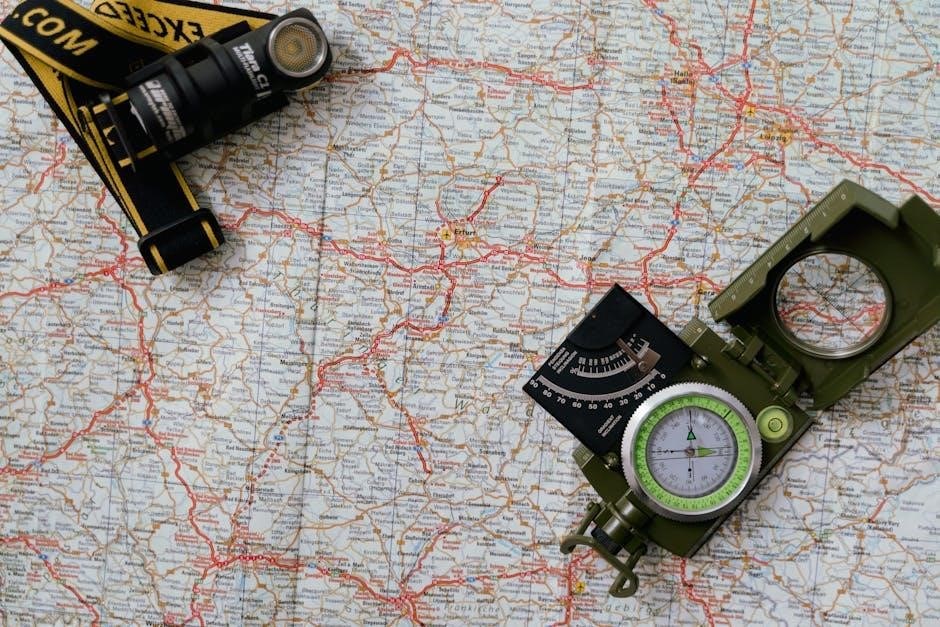The Rogue is a versatile and cunning class, excelling in stealth, deception, and precision. With unparalleled skill mastery, they thrive in shadows, manipulating situations to their advantage.
Overview of the Rogue’s Role in Pathfinder
Rogues are versatile characters, excelling in stealth, deception, and precision. They thrive as scouts, saboteurs, and cunning combatants, using their skills to outwit foes. Whether manipulating social situations or striking from the shadows, rogues adapt to any scenario. Their expertise in exploration, interaction, and combat makes them indispensable to parties, blending versatility with deadly efficiency in both melee and ranged encounters.
Key Characteristics and Playstyle
Rogues are defined by their agility, cunning, and mastery of skills like Stealth and Sleight of Hand. They rely on Dexterity for both combat and skill checks, making it their primary ability. Rogues excel in melee with Weapon Finesse or at range, using Sneak Attack for devastating strikes. Their playstyle emphasizes strategy, positioning, and adaptability, allowing them to excel in various roles while maintaining a unique identity.

Skills Overview for Rogues
Rogues possess the largest array of class skills, making them exceptionally versatile. Skills like Stealth, Bluff, and Sleight of Hand are crucial for their cunning playstyle and effectiveness.
The Most Essential Skills for Rogues
Rogues rely heavily on key skills to execute their roles effectively. Stealth is crucial for unseen movement and ambushes, while Bluff enables deception and social manipulation. Sleight of Hand is vital for covert actions like pickpocketing or disarming traps. Perception ensures awareness of hidden dangers, and Disable Device helps neutralize threats. Escape Artist and Acrobatics round out the essentials, providing mobility and flexibility in tight situations. Mastering these skills defines a rogue’s versatility and lethality.
Stealth, Bluff, and Sleight of Hand: Mastery Tips
Mastery of Stealth, Bluff, and Sleight of Hand is essential for rogues. Use high Dexterity for Stealth and invest in Charisma for effective Bluffing. Practice misdirection to distract foes, and use Sleight of Hand for seamless item manipulation. Train in these skills to create opportunities for ambushes, deceive enemies, and perform covert actions effortlessly. These skills define a rogue’s cunning and lethality in both combat and social scenarios.

Class Features and Talents
Rogues excel with Sneak Attack, dealing bonus damage from hiding or flanking. Evasion allows dodging area effects, while Rogue Talents offer customization, enhancing abilities like stealth or combat prowess.
Sneak Attack and Evasion: Core Abilities
Sneak Attack is the Rogue’s hallmark, delivering bonus damage when attacking from hiding or flanking. Evasion allows Rogues to dodge area effects, making them resilient in combat. These abilities define the Rogue’s deadly precision and survival instincts, enabling them to thrive in both combat and stealth scenarios. Mastering these core features is essential for maximizing the Rogue’s effectiveness in any situation.
Rogue Talents: Customization and Versatility
Rogue talents offer immense customization, allowing players to tailor their character’s abilities to fit their preferred playstyle. From combat-enhancing tricks like Weapon Training to stealth-focused options like Master of Disguise, talents provide versatility; Many talents enhance sneak attack effectiveness, while others improve survival or social skills. This system ensures Rogues remain unique and adaptable, making each build distinct and powerful in its own right without relying on multiclassing.

Combat Strategies for Rogues
Rogues excel in combat by leveraging stealth, precision, and flanking. Use sneak attacks, positioning, and allies to outmaneuver foes, ensuring maximum damage while minimizing risk.
Melee Combat: Feint and Two-Weapon Fighting
Feint is a cornerstone of melee rogues, allowing them to create openings for sneak attacks. Combined with Two-Weapon Fighting, rogues can deliver devastating flanking strikes. Ensure proficiency in Weapon Finesse and Improved Initiative for optimal combat agility. Positioning is key—use allies to set up flanks and maximize sneak attack opportunities. Dexterity is crucial for maintaining accuracy and evasion in close quarters, making it a primary stat for melee builds. Mastering these tactics ensures rogues remain lethal and adaptable in combat scenarios.
Ranged Combat: Effective Use of Sneak Attack
Ranged rogues excel at dealing sneak attack damage from a distance, with attacks working within 30 feet. Position yourself to flank enemies, leveraging allies to create openings. Feats like Weapon Finesse and Point-Blank Shot enhance accuracy and range. Archetypes such as the Scout specialize in ranged combat, offering improved mobility and attack bonuses. Mastering ranged sneak attacks allows rogues to remain deadly while avoiding direct melee threats, ensuring versatility in combat situations.
Flanking and Positioning for Maximum Effect

Flanking is crucial for rogues to trigger sneak attacks. Position yourself and an ally on opposite sides of an enemy, ensuring you’re both threatening the same target. This setup bypasses their Dexterity bonus to Armor Class, maximizing damage potential. Effective positioning also allows escapes from danger, utilizing high Dexterity for mobility. Proper flanking and positioning are key to a rogue’s combat efficiency, ensuring they remain both deadly and elusive.

Feats for Rogues
Feats like Weapon Finesse and Improved Initiative enhance a rogue’s combat prowess, ensuring precision and speed in critical moments, making them indispensable for optimal builds.
Weapon Finesse and Improved Initiative
Weapon Finesse allows rogues to use Dexterity for melee attacks, crucial for maintaining accuracy without high Strength. Improved Initiative enhances turn order, granting rogues the upper hand in combat by acting first. These feats are essential for builds focusing on agility and precision, ensuring rogues excel in both offense and tactical positioning. They are often considered mandatory for optimizing rogue effectiveness in Pathfinder.
Acquiring Feats for Additional Rogue Talents
Feats like Weapon Finesse and Improved Initiative are crucial for enhancing a rogue’s effectiveness. Selecting feats that complement your build ensures versatility in combat and skill use. While some feats may feel like taxes, they are essential for optimizing certain playstyles. Multiclassing can also unlock additional feat options, allowing rogues to further customize their abilities and synergize with other classes for unique builds.

Archetypes for Rogues
Archetypes offer customization, allowing rogues to specialize in unique playstyles while enhancing core abilities. They provide thematic focus, ensuring each rogue stands out in their chosen role.
Popular Archetypes: Thug, Rake, and Scout
The Thug excels in combat, using brute strength to dominate enemies, while the Rake blends charm with lethality, perfect for social manipulation. Meanwhile, the Scout combines rogue skills with ranger abilities, excelling at ranged attacks and survival, making each archetype a unique choice for diverse playstyles and campaign needs.
Choosing the Right Archetype for Your Build
Selecting the right archetype depends on your playstyle and campaign focus. Consider whether you want to emphasize combat prowess, social interactions, or exploration. Each archetype offers unique abilities, so align your choice with your character’s backstory and role in the party to maximize effectiveness and enjoyability in the game.

Multiclassing as a Rogue
Multiclassing can enhance a Rogue’s versatility, combining stealth with magical or martial abilities. It requires careful planning to maintain Rogue effectiveness without diluting core strengths.
When and How to Multiclass Effectively
Multiclassing a Rogue requires strategic planning to enhance abilities without compromising core strengths. Consider classes like Ranger or Bard for combat versatility or spellcasting. Ensure feats and talents align with the build, maintaining Dexterity and Intelligence for skill proficiency. Timing is crucial; multiclassing early preserves key Rogue features while integrating new abilities seamlessly.
Maintaining Rogue Effectiveness in Multiclass Builds
To preserve a Rogue’s effectiveness in multiclass builds, prioritize Dexterity and Intelligence for skill mastery and combat prowess. Focus on feats like Weapon Finesse or Critical Focus to enhance accuracy and damage. Avoid diluting Rogue talents with too many classes, ensuring core abilities like Sneak Attack remain impactful. Maintain a high Dexterity score to leverage light armor and mobility, while keeping Intelligence sufficient for skill ranks. Balance is key to retaining the Rogue’s signature versatility and lethality.

Character Customization and Backstory
A well-crafted backstory defines a Rogue’s identity, whether as a mysterious thief or a redeemed outlaw. Personality traits like cunning or charming enhance roleplaying and party dynamics.
Creating a Compelling Rogue Backstory
A Rogue’s backstory should reflect their cunning nature and mysterious past. Consider their origins: were they a street urchin, a thief, or an assassin? Define their motivations—greed, revenge, or redemption. Add depth with past relationships or tragic events. Link their backstory to class features, like how they mastered stealth or acquired a signature weapon. A strong narrative enhances roleplaying and connects them to the campaign world.
Personality Traits and Roleplaying Tips
Rogues often embody charisma and wit, using charm to manipulate situations. They may be cynical or mistrusting, reflecting a life of survival. Roleplay their cleverness in dialogue and problem-solving. Highlight their resourcefulness, using skills creatively. Portray their ethical ambiguity—walking the line between heroism and self-interest. Emphasize their independence, showing reluctance to trust others. These traits make the Rogue a dynamic, engaging character in any campaign.

Advanced Tips and Tricks
Master clever skill uses, optimize builds for specific campaigns, and exploit enemy weaknesses. These advanced strategies elevate your Rogue from effective to exceptional in any scenario.
Clever Use of Skills in Creative Situations
Rogues can turn skills like Stealth into tools for creative problem-solving. Use Sleight of Hand to pilfer items discreetly or Bluff to deceive foes. In combat, Feint can create openings for allies, while Perception uncovers hidden enemies. Even Disable Device can disarm traps without triggering them. Creative skill use transforms a Rogue into an indispensable asset, solving challenges others can’t.
Optimizing Rogue Builds for Specific Campaigns
Rogues shine when tailored to a campaign’s demands. For combat-heavy games, invest in Weapon Finesse and Two-Weapon Fighting. In stealth-focused campaigns, maximize Stealth and Sleight of Hand. For high-magic settings, consider Evasion and Improved Evasion. Feats like Callous Casting enhance versatility, while abilities like Clever Feint offer tactical advantages. Tailor your build to the campaign’s tone, ensuring your Rogue remains effective and adaptable in any scenario.
The Rogue’s blend of stealth, cunning, and adaptability makes them a compelling choice for any Pathfinder campaign. Each adventure is a canvas for creativity, offering endless opportunities to shine in unique ways.
Final Thoughts on Playing a Rogue in Pathfinder
Embrace the Rogue’s versatility by mastering core skills like Stealth and Sleight of Hand. Focus on Dexterity and Intelligence for optimal performance. Multiclassing can enhance your build, but staying single-class offers deep customization. Archetypes like Thug or Scout add unique twists. Remember, creativity is key—use your skills innovatively to outwit foes and solve challenges. With practice, your Rogue will become a formidable asset to any party.
Encouragement for New Players
Starting as a Rogue can be daunting, but it’s incredibly rewarding. Don’t be afraid to experiment with different builds and archetypes. Focus on key skills like Stealth and Bluff, and remember that creativity in problem-solving is as important as combat prowess. Engage with your party’s story and develop a rich backstory to enhance your roleplaying experience. Most importantly, have fun and embrace the Rogue’s cunning nature!



